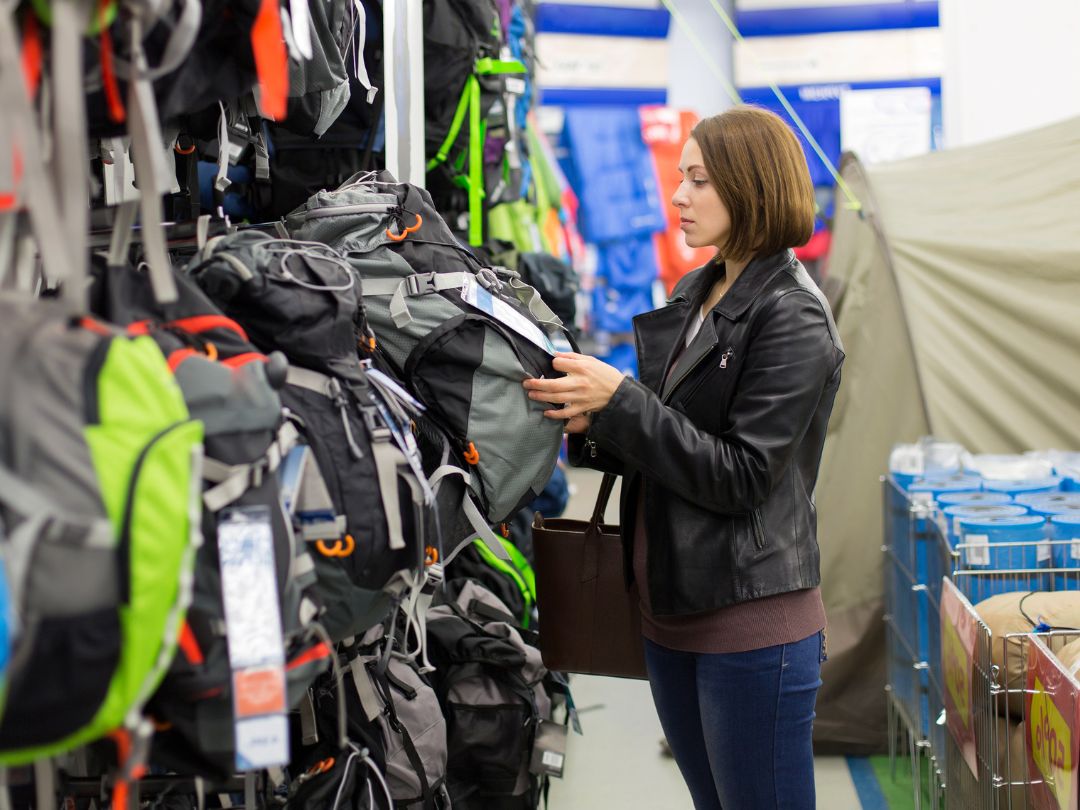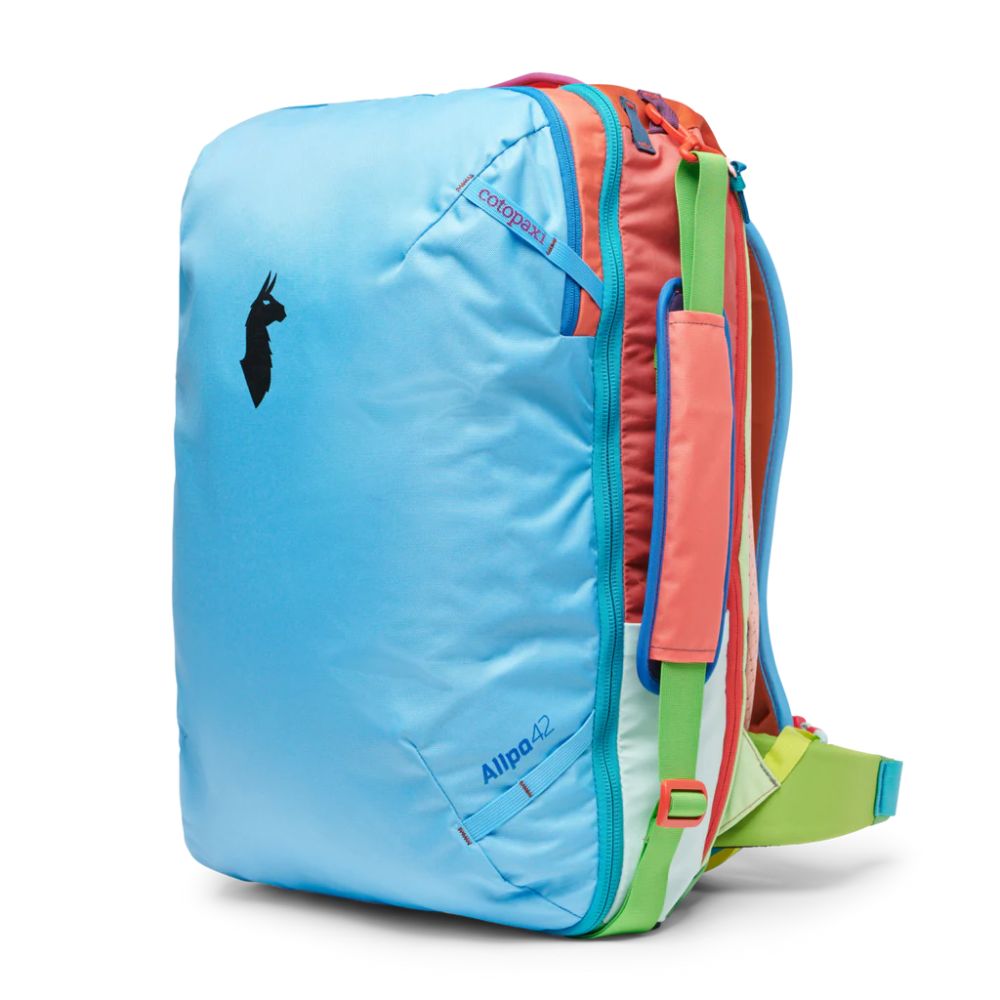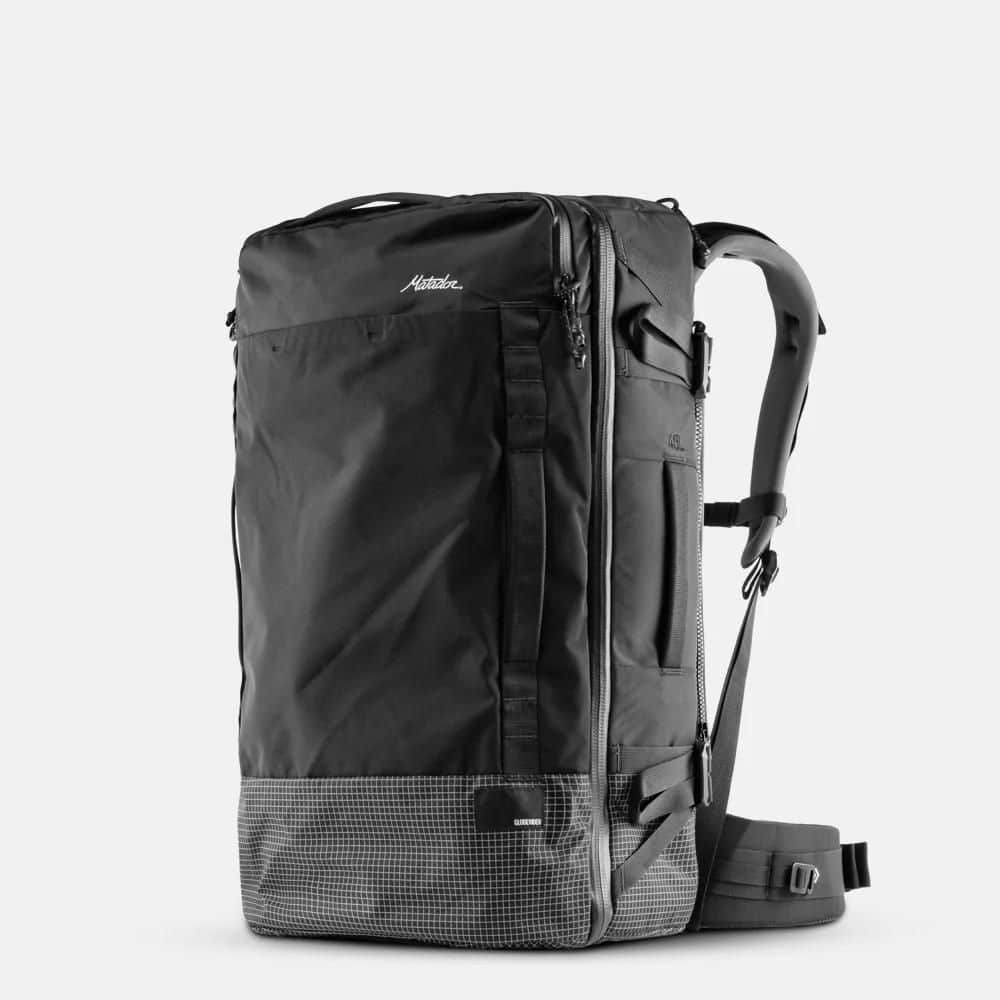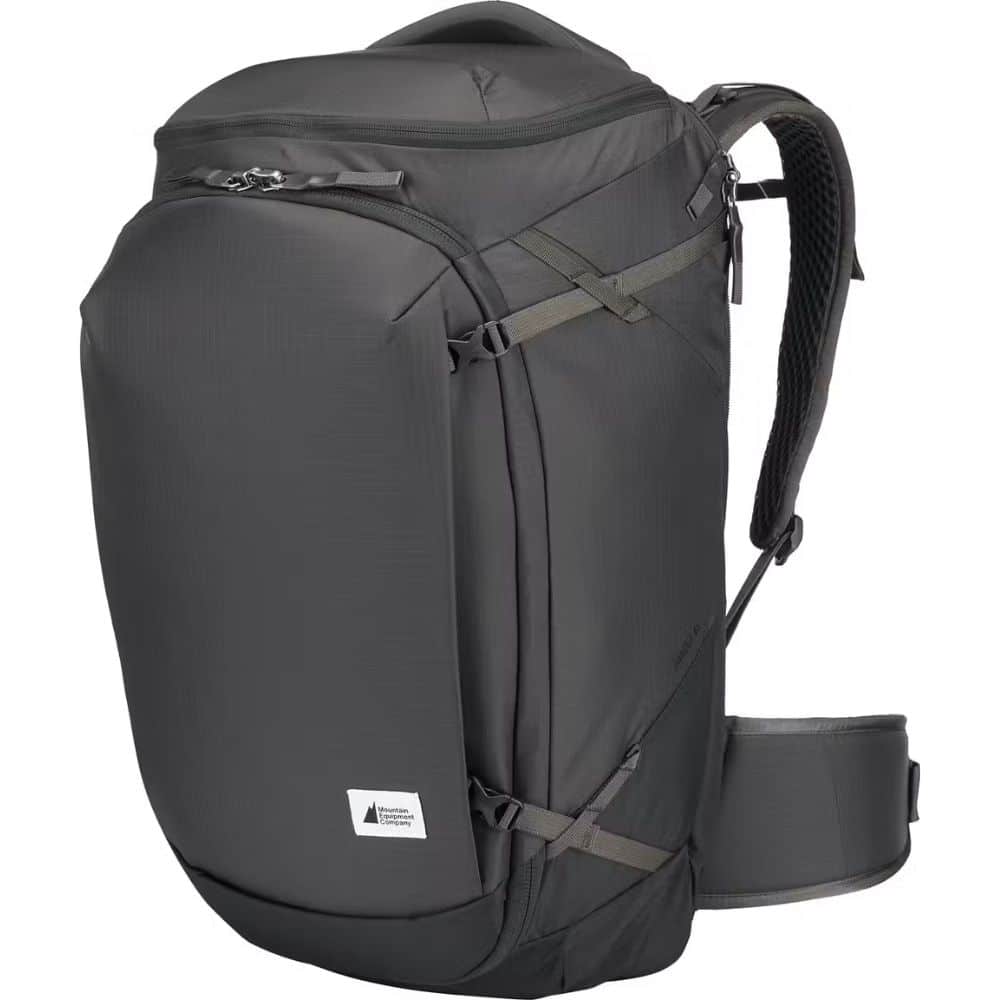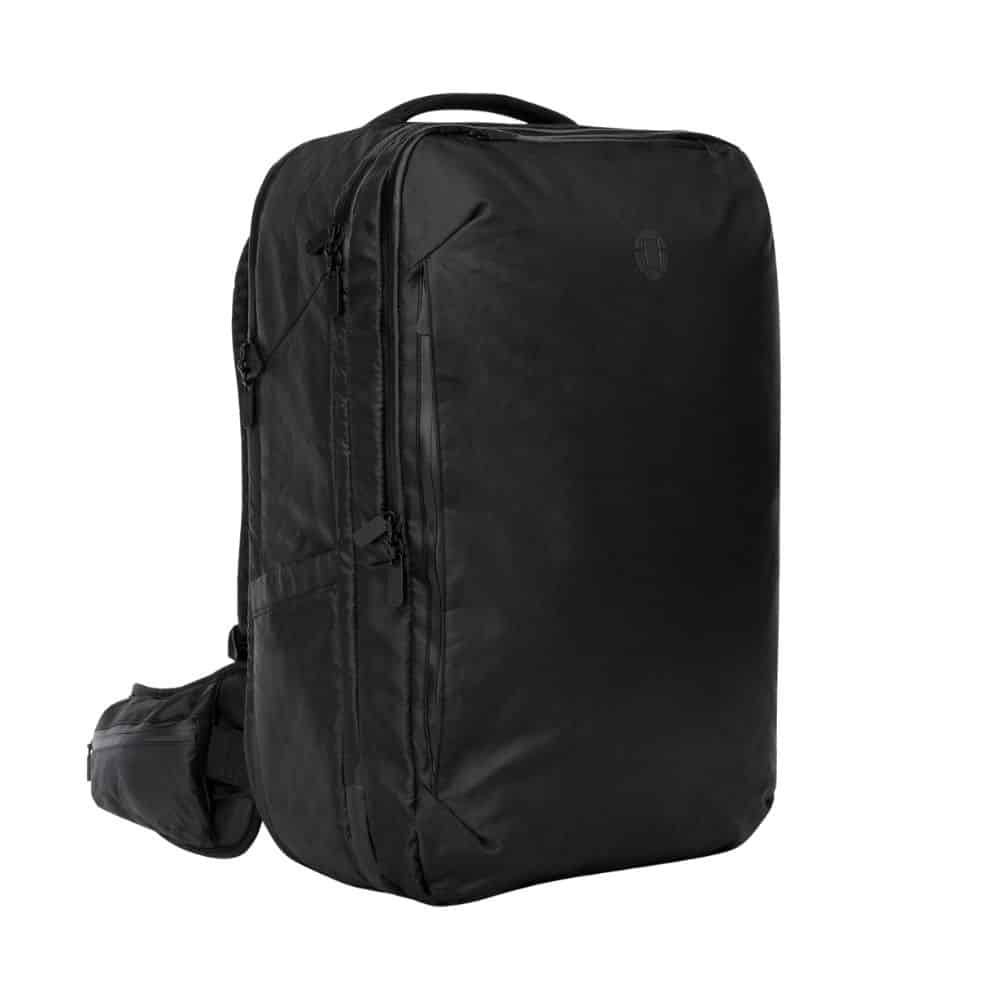This article may contain links to products and services we use and recommend. We may receive compensation when you click on links to those products. For more information, see our Disclosure Policy.
Isn’t it time to lighten your load? In this article, I will delve into the advantages of traveling light and provide expert tips on choosing the ideal travel pack for your needs – whether you’re a seasoned traveller or planning your first adventure. Get ready to revolutionise the way you travel – with your ultimate (carry-on) travel companion.
Why a carry-on travel pack is the way to go
I have stopped counting the number of travellers we see daily on the road, lugging around ginormous travel packs that precariously sway over their heads. We wish we could talk to everyone there and convince them to travel light next time.
We’ve been there. During our three-month trip in 2012, we travelled with our big 70-litre travel packs. These past eight years, though, we have only travelled with carry-on travel packs, and we would never go back.
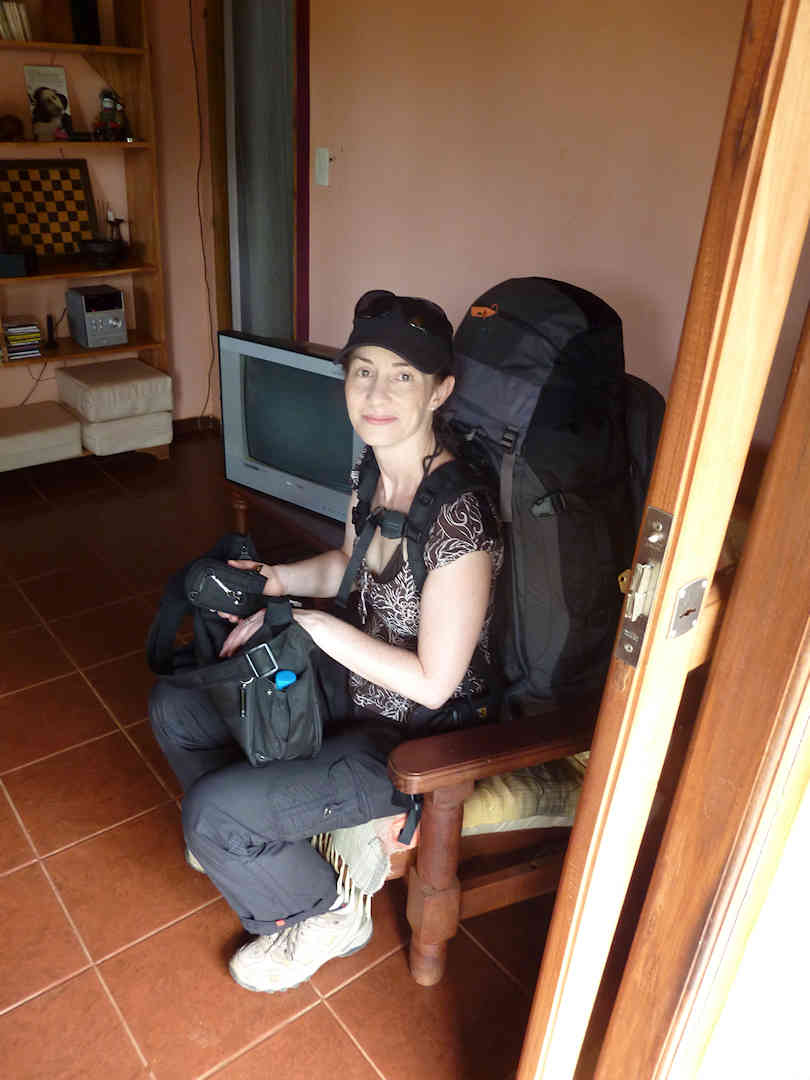
Sandra and her giant backpack in 2012
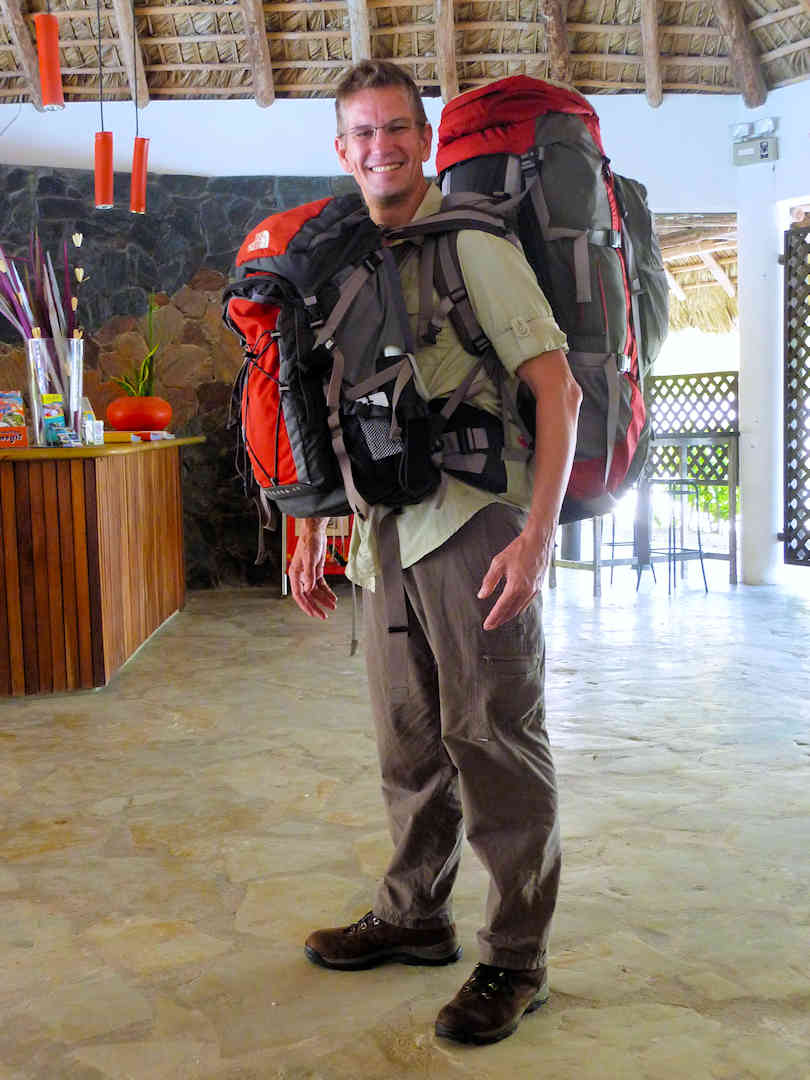
Paul, the double-sided tortoise, in 2012
So, what are the benefits of travelling light? Here are three of them, but there are way more…
It makes arriving a breeze
Have you ever waited for (what seems like) an eternity at the luggage carousel? The conveyor belt seems to be the most popular place on earth. You can’t see a thing as everyone else has claimed their spot right next to it. As the place slowly empties, you wonder what happened to your luggage. And then, finally, half an hour after you went through security, it appeared, and you breathed a sigh of relief.
Now imagine travelling with a carry-on: You grab your travel pack out of the overhead locker and swiftly walk past fellow travellers (who have somehow managed to take the kitchen sink on board). The lines at security are still short. A few minutes after you land, you’re out of the airport, greet your friends/family, and/or grab that train/bus/taxi into town.
Recommended ultralight packable daypack options
Need an ultralight packable daypack for your everyday needs AND your travels? Find the one that’s right for you with our buyer’s guide.
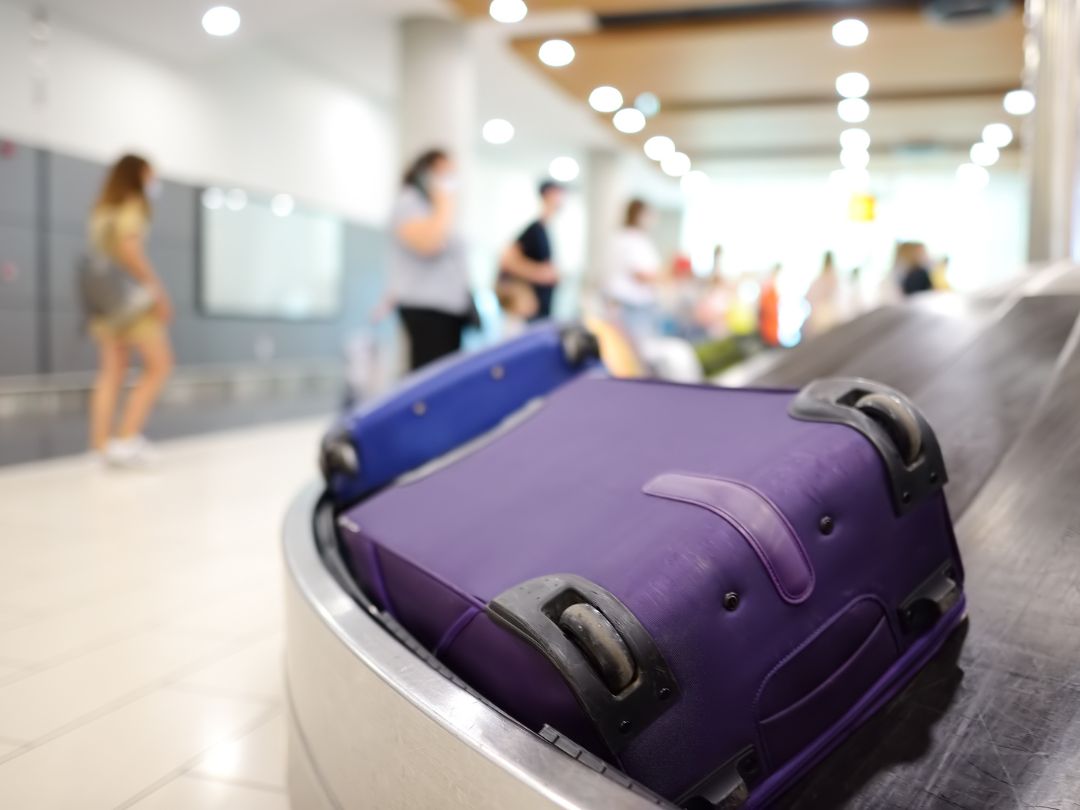
No need to wait for your luggage if you have carry-on only
Your luggage can’t get delayed, lost or stolen
How many times was your luggage delayed or even lost or stolen?
- One year, I arrived in Berlin on Christmas Eve without a winter jacket (since we flew in from Sydney, where it was summer). Four days later, my check-in luggage finally arrived, damaged and unusable. A strike combined with bad weather (and Christmas) had made Heathrow Airport a giant luggage warehouse.
- Paul almost missed out on competing in a half marathon in Italy a few years ago when our plane was delayed in Dubai, and Emirates wasn’t fast enough to get our luggage from one plane to the next. We were reunited with our check-in luggage (including his running gear) less than 12 hours before the race.
Everyone who has ever travelled with check-in luggage can tell similar stories. Not much fun.
If you travel solo, how often have you wished you had a travel buddy to look after your 70-litre pack while quickly popping into the bathroom (or elsewhere)? A carry-on travel pack is small and light enough to take wherever you go. We even did a food tour once in Berlin with our carry-ons on our backs.
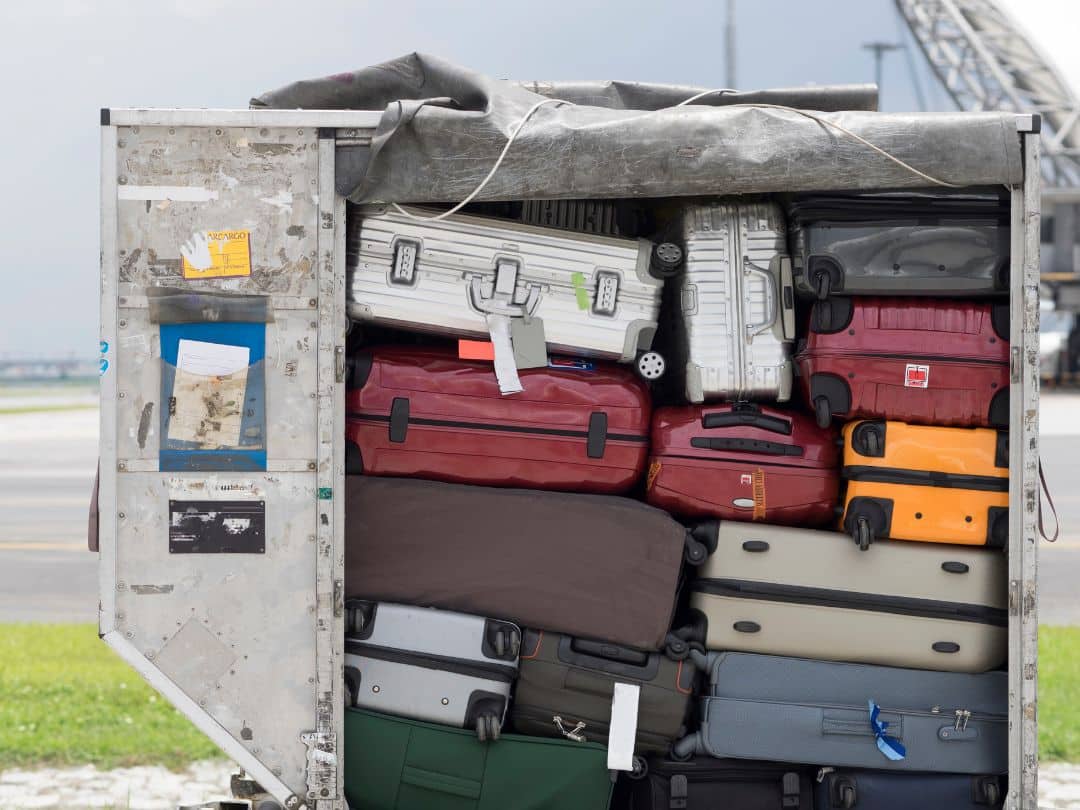
Travel with carry-on only and you won't have to worry about your baggage getting damaged or lost
It may just save your travel plans
Imagine you wake up late. You have 30 minutes to catch your train. The train station is a good 20-minute walk away. The morning traffic is horrendous. If you want to make your train, you have to run.
Now imagine you have a (check-in sized) wheelie, a day pack, or a 70-litre backpack. You gather your gear as quickly as possible, but it still seems like an eternity until you’ve descended the stairs and out onto the streets. The streets to the train station are cobble-stoned and full of people heading to work. Good luck making that train.
Now imagine grabbing your carry-on travel pack. It’s packed and ready in a flash. You run down the stairs and along the streets, shouting apologies as you zigzag between people. You only carry 10 kilograms on your back, so moving on cobble-stones is not too difficult. What are your chances of catching that train?
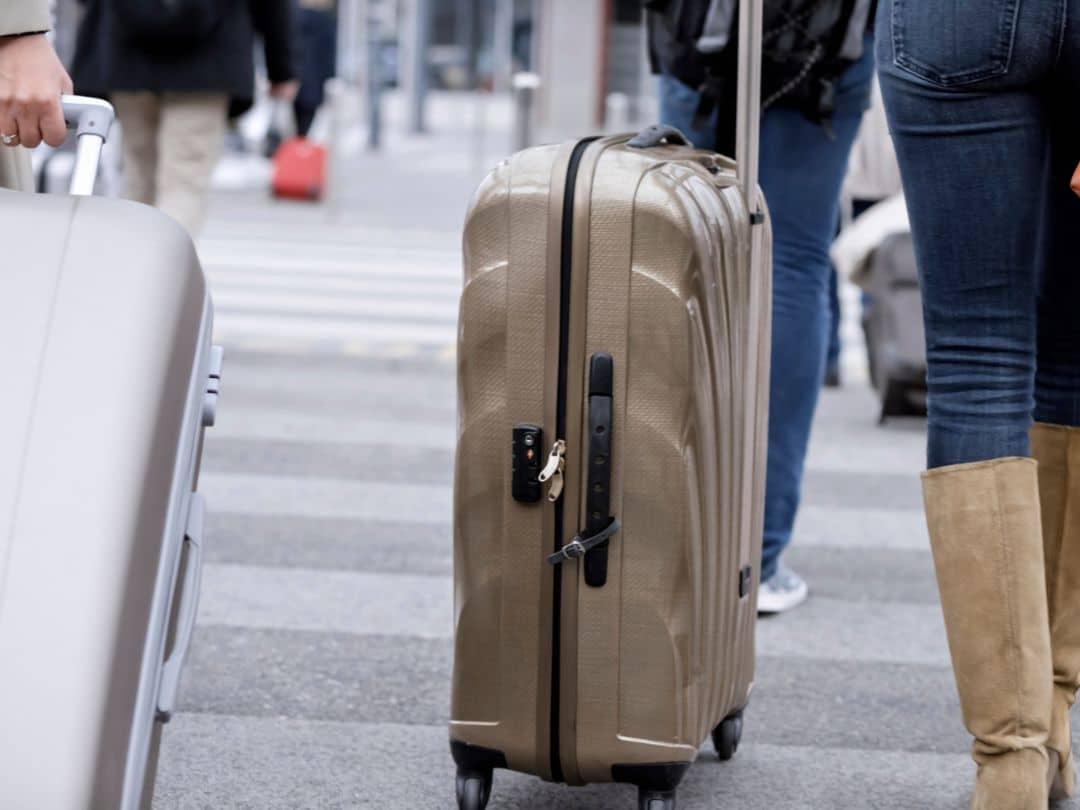
Finding it difficult to navigate busy city streets with wheeled luggage? Use a travel pack instead.
What is considered carry-on?
Size and Weight
Unfortunately, every airline has its carry-on luggage rules, especially regarding weight. Some allow ten kilograms, others only seven. Those with cheaper tickets and lower seat limits are often the ones where the rules are enforced (to make extra money for the airline’s shareholders).
The amount you can bring into the cabin depends on whether you travel domestically or internationally and your seated class. So, check the rules (on the airline’s website) before you book your flight.
The most common dimensions are 56 x 36 x 23 cm | 22 x 14 x 9 in – with height, width and depth adding up to 115 cm | 45 in. By pure maths, this gives you about 46 litres – the (maximum) luggage size you are looking for when finding your perfect carry-on travel pack.
Hand Luggage vs Personal Item
Most airlines allow one piece of hand luggage (up to the weight limit they impose) plus one personal item (which does not usually count towards the weight of your hand luggage but must be small enough to fit under the seat in front of you).
When we encounter airline staff that takes the weight limitations (too) seriously, we put
- my sling bag (my usual personal item) and whatever makes my travel pack too heavy into my Sea to Summit Ultra-Sil Shopping Bag (usually used to carry groceries or laundry), which then becomes my personal item; and
- Paul’s laptop (and whatever else makes his travel pack too heavy) is included in our Matador Freerain22 Daypack, which becomes his personal item.

A soft-sided carry-on travel pack is easy to store in the overhead locker
How do you choose the carry-on travel pack that’s right for you?
Before you go shopping, think about and write down your requirements. They may not be as obvious initially, but the more you look at the options, the more precise they’ll become. To help you get started, here is the list of criteria we’ve developed over the past eight years of carry-on-only travel:
Close to maximum carry-on limit
Initially, we weren’t sure how much we’d need, but the more we looked at different sizes, we realised that less than 40 litres would be a bit of a squeeze for me and less than 45 litres a squeeze for Paul – even as a practising minimalist.
Apart from the volume, check the actual dimensions of any pack. A tall and narrow travel pack (similar to a hiking rucksack) might be 40 litres, but if the dimensions are (way) off, you may still be forced to check it in.
Ultra-lightweight yet super strong
The lighter your travel pack, the more you can carry until you reach the 7kg or 10kg carry-on weight limit.
On the other hand, it must be super strong to withstand the daily (ab)use on your travels. The last thing you want is for your travel pack to burst open at a busy intersection in Hanoi or when you’re jumping on a chicken bus in Guatemala. Look for light-weight rip-stop material (the material will stop a small puncture and turn into a giant tear, hence the name), and especially check the zippers (ideally YKK) and seams (best if they are multi-stitched) – notorious weak points on any backpack.
Proper hip belt to distribute the weight evenly
That’s an absolute must (and I’m surprised how many carry-on travel packs don’t come with one). Your full travel pack must sit comfortably on your hips to take the weight off your shoulders and back. So, if your health is essential, ensure your carry-on travel pack has a proper hip belt.
We prefer hip belts attached to the pack, but they can be stowed away when needed (for example, on rare occasions, you may need to check your travel pack).

To distribute weight evenly, a carry-on travel pack should have a sturdy yet comfortable hip belt
Stretchy side pockets that fit a water bottle
Staying hydrated is essential when travelling. The Klean Kanteen 27 oz Wide Water Bottle is our recommended reusable water bottle. Whatever water bottle you travel with needs to go somewhere. You don’t want to (have to) carry it in your hand all the time. Trust me. That’s what side pockets are for.
Ensure the side pocket is broad and deep enough to fit your water bottle. If your water bottle fits, but the pocket is a bit shallow (making it easy for the bottle to fall out), look for ways to secure it to your pack (for example, by looping a compression strap through or around its cap).
The laptop compartment at the back
This goes hand in hand with the former. A laptop is likely the heaviest item you carry in your travel pack. So, the best place for it is right against your back. \
You also want to easily access your laptop (even when the travel pack is full) – for example, when you go through security. Thus, a separate, zippered laptop compartment you can access from the outside is best.
Easy access compartment for your toiletry bag
Speaking of security, your toiletry bag is another item you’d want easy access to whenever you go through security. A toiletry bag usually weighs a bit (at least mine does), so I prefer a separate zippered compartment (at the bottom or top) that can be accessed easily from the outside.
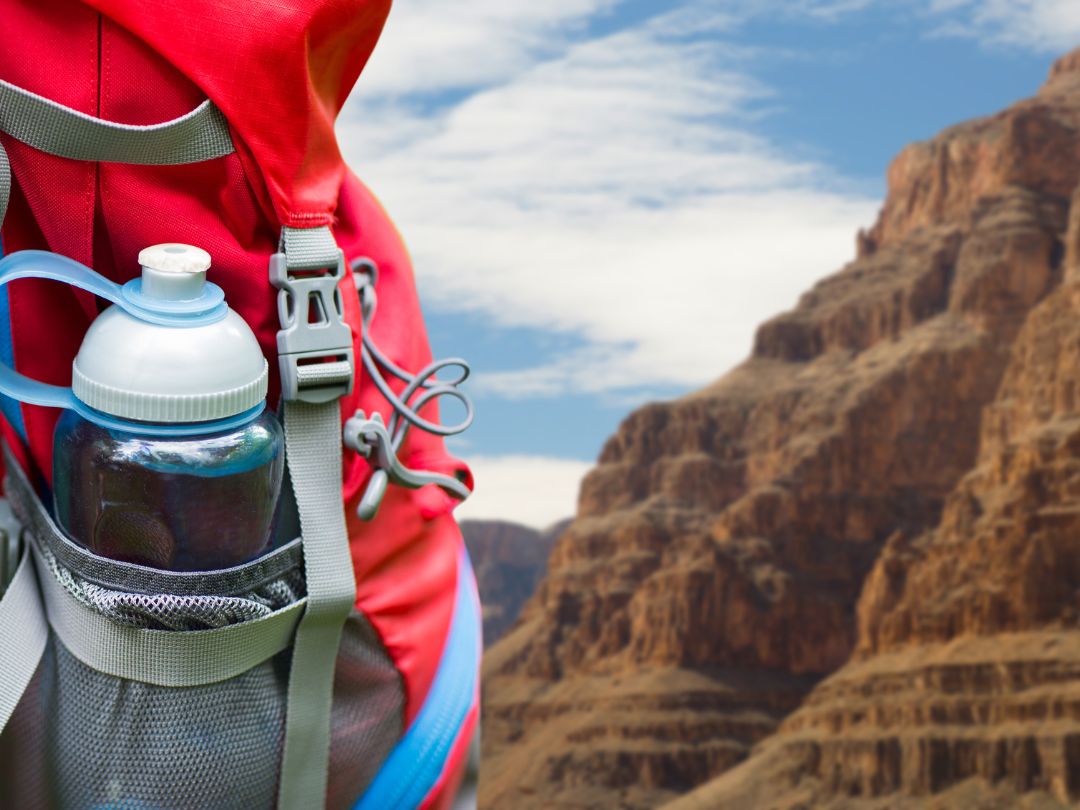
Hydration is important: Make sure your travel pack has at least one side pocket to fit your water bottle
Clamshell design (ideally not split case)
A travel pack that opens like a suitcase (rather than from the top) makes (un)packing and accessing an item on the go a breeze. Fortunately, most carry-on travel packs these days have such a clamshell design.
Like suitcases, some clamshell travel packs have just one large main compartment on one side of the clamshell (plus several outside compartments for easy access). Others feature a split case design – which means there are storage compartments on either side of the clamshell. These splits are mostly 50/50 (same-size zippered compartments on either side). But we’ve also seen 70/30 and 80/20 splits, and travel packs that further compartmentalise each side of the clamshell.
We prefer to use (removable) packing cubes rather than fixed compartments for our clothes and shoes, and would therefore steer clear of split cases.
Lockable zips
Travelling with a carry-on, you’ll have your luggage on you most of the time. But if you do have to check in your luggage (for example, if the bus is too crowded or your plane too small) lockable zips come in handy.

Clamshell-design travel packs make (un)packing and accessing items on the go a breeze
Want to know what we pack as full-time location-independent explorers?
We research and document every item that we carry as travellers, whether during van life in our backpacks or as digital nomads, earning a living on the road. These packing lists are all based on our own experience. If you travel (and who doesn’t) and you have something to add as recommendations for the items to carry, please feel free to contact us.
If you liked our packing lists and found them helpful, we would appreciate it if you could share them with your friends and family via the Share buttons below. Even better, link to the page from your personal blog or social media platforms.
Fairly priced
Good quality luggage is not cheap – that includes carry-on travel packs. There are a lot of Chinese-branded travel packs available online that are insanely cheap. While we have no experience with them, we’d be concerned about their quality (see above) and doubt that they are made ethically and sustainably.
Good warranty
Many carry-on travel packs on the market these days come with lifetime guarantees and/or repair programs – a sign that the company stands by the quality of its products. So, if you’re undecided between two models, maybe the warranty terms will help you make the call.
Water repellent and/or with (built-in) rain cover
This is more of a nice-to-have requirement (at least for us) as there are other ways to protect your gear from a downpour – for example, a rain poncho (which not only covers your luggage but you as well).
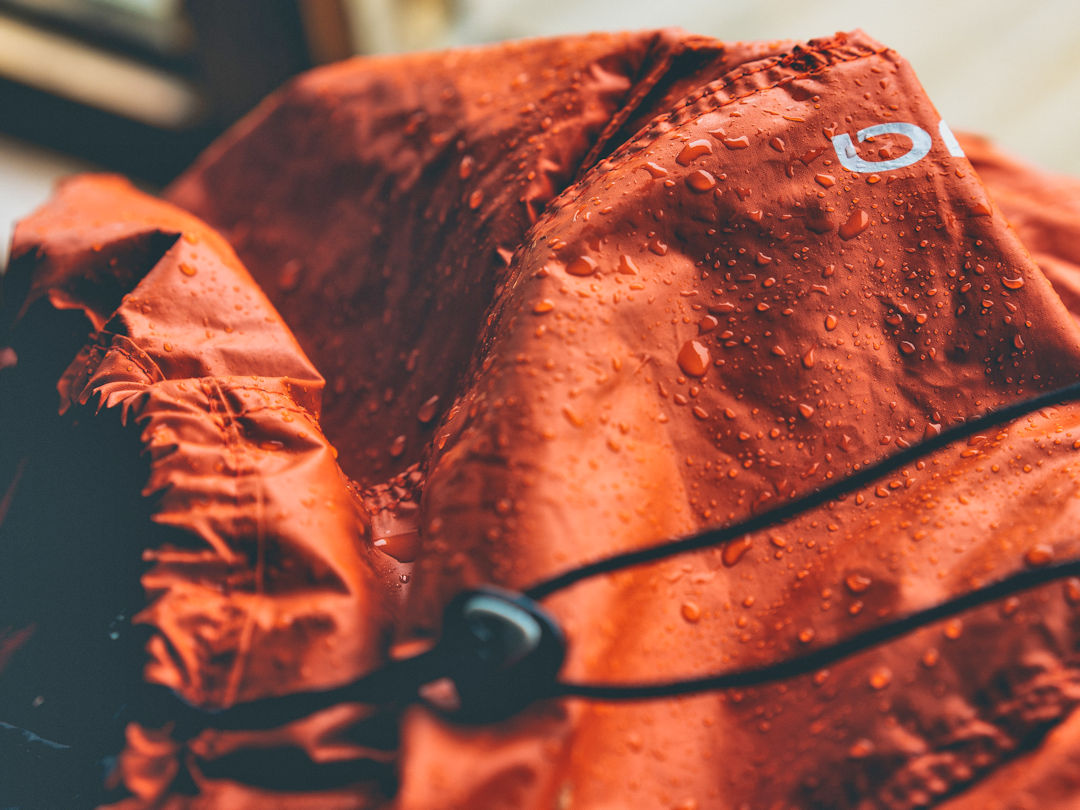
If you want your travel pack to be water repellent, make sure its materials are PFC-free
Sustainability
Last but not least, it’s essential to ensure the manufacturing of your travel pack is done as sustainably and ethically as possible:
- Most lightweight, durable travel packs (at least for now) are made from petrochemicals. So, if possible, select a travel pack made from recycled materials. For travel packs made from virgin materials, check if the materials are Bluesign-approved and/or if the manufacturing process adheres to the Bluesign Restricted Substances List to ensure strict ecological and toxicological standards are met.
- If you want your travel pack to be water-repellent, consider models that use perfluorochemical(PFC)-free methods to achieve durable water repellency (DWR).
If nothing else, check the sustainability credentials of the brand you buy from. If you can’t find anything (of any substance) on their website, chances are they don’t care.
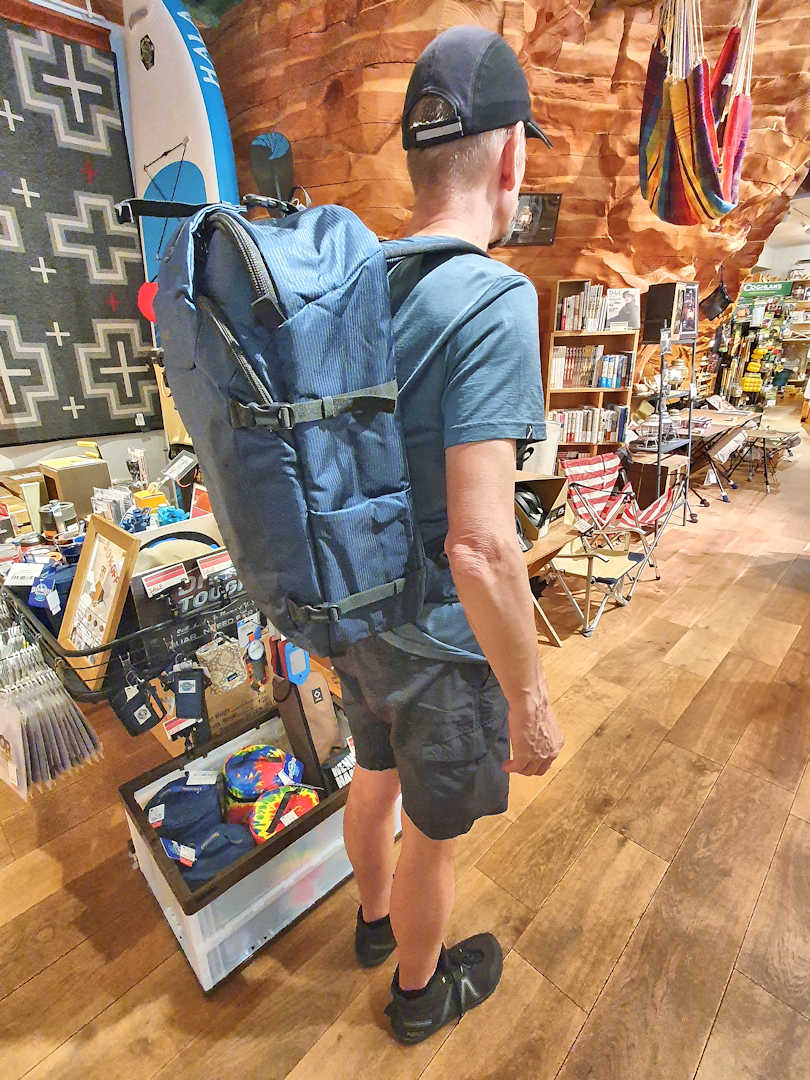
Our Top 10 Carry-On Travel Packs include: the Pacsafe Venturesafe EXP45

... and the Peak Design Travel Backpack 45L
How do carry-on travel packs compare?
We researched and tested more than two dozen travel packs from different manufacturers before deciding on our top 10 list below.
For our comparison (in alphabetical order), we have considered travel packs that retail between USD150 and USD350, and
- offer a minimum volume of 40 litres;
- weigh less than (approximately) 2kg / 4lbs 7oz;
- come with a (proper) hip belt and
- have at least one water bottle in the side pocket.
Click on the name of the model you are interested in to reveal more detail and find one that ticks all (or at least the most important ones) of YOUR boxes:
-
Cotopaxi Allpa 42L Travel Pack
-
Gregory Border Carry-On 40
-
Matador GlobeRider45 Travel Backpack
-
MEC Pangea 40 Carry On Travel Pack
-
Pacsafe Venturesafe EXP45 Anti-Theft Carry-On Travel Pack
-
Peak Design 45L Travel Backpack
-
Topo Designs Global Travel Bag 40L
-
Tortuga 40L Travel Backpack
-
Zoomlite Road Warrior Travel Carryon Backpack
What did/would we choose (based on our needs)?
We started our 2016 minimalist journey with the Osprey Ozone 46 (Sandra) and the Tortuga V2 (Paul), which are no longer manufactured.
Paul’s Tortuga lasted seven years. The fabric was not rip-stop, and it started to fray along the seams – an area difficult to repair (multiple times). He now travels with the Matador GlobeRider45 Travel Backpack. It’s at the higher end of the weight spectrum but met all his requirements otherwise.
I still use my original Osprey Ozone 46. It’s lighter than any comparable travel pack I’ve come across in seven years and super sturdy. So why change something that works well? That said, if I had to purchase a new travel pack tomorrow, it would be the MEC Pangea 40 Carry-On Travel Pack. It suits my needs (almost) perfectly.

We currently travel with an Osprey Ozone 46 (no longer manufactured) and a Matador GlobeRider45 Travel Backpack
Want to learn more with our buyer's guides?
Are you heading overseas for your next big adventure? Or away for the weekend and need to replace your luggage? We can help you in selecting the right travel pack and daypack with our useful buyer’s guides – all based on our years of being location-independent.
Before you go, if you liked our article and found it helpful, we would appreciate it if you could share it with your friends and family via the Share buttons below. Even better: Leave a short review on Trustpilot or Google, which would help us further build our online reputation as a (trustworthy and helpful) travel and lifestyle blog.

